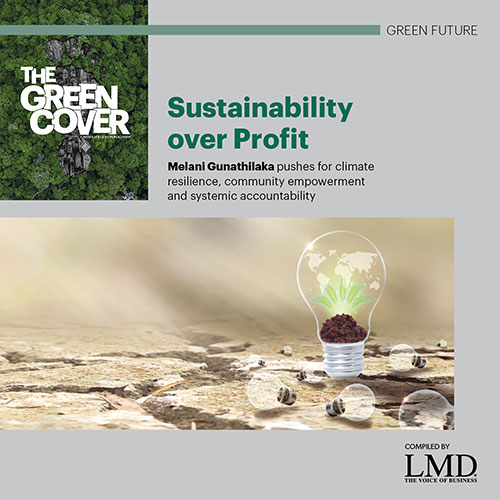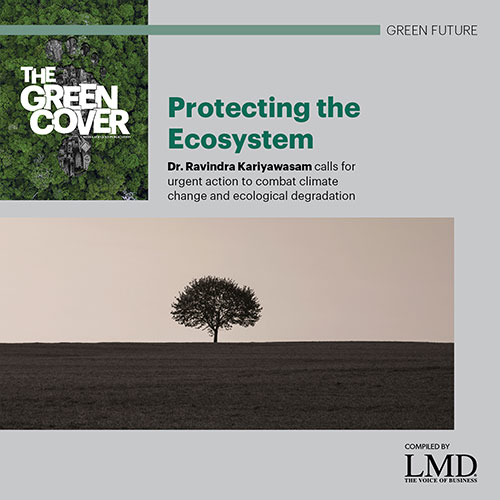CORPORATE PROFILE – COLOMBO STOCK EXCHANGE
COLOMBO STOCK EXCHANGE

CEO
Q: What are ‘green bonds’ and what is the purpose of introducing these in the Sri Lankan stock market?
A: Green bonds are a form of corporate debentures, which aim to raise funds that are invested exclusively for green projects to generate climate or other environmental benefits as defined by globally accepted Green Bond Principles (GBP). These serve the purpose of financing environmentally-friendly initiatives. Their structure is identical to those of traditional bonds.
Q: What are some of the environmental projects that green bonds could potentially finance in Sri Lanka?
A: Renewable energy projects, waste management initiatives and ‘waste to energy’ projects are options that have the capacity to provide returns on investment (ROI), and align with the objectives of green bonds, making them suitable candidates for funding.
Q: What are the GBPs, and why are they important for ensuring transparency and accountability in the use of green bond proceeds?
A: The Green Bond Principles are frameworks established by organisations such as the International Capital Market Association and Climate Bonds Initiative. These principles help to mobilise capital for ‘climate smart’ or environmentally-friendly investments.
They require the establishment of certain processes and key performance indicators (KPIs), to ensure both qualitative and quantitative reporting requirements. The principles promote transparency and accountability by setting standards for reporting on the use of green bond proceeds. This gives investors confidence that their investments are supporting genuine green projects.
Q: How are green bonds different from corporate debentures, and what are the trading parameters for green bonds on the Colombo Stock Exchange (CSE)?
A: Green bonds have additional requirements compared to regular corporate bonds. In addition to the existing disclosure requirements, issuers of green bonds must comply with specific processes and KPIs related to green projects.
This includes obtaining certification from a third party reviewer or certifier to confirm conformity with the Green Bond Principles. Pre- issuance and post-issuance certifications are also required along with a second party opinion.
These additional requirements ensure that the funds raised through green bonds are used appropriately. However, other continuing listing requirements and the trading parameters for green bonds on the CSE are similar to those for traditional corporate bonds.
Q: Who can issue green bonds in Sri Lanka, and what are the benefits of issuing and investing in these?
A: In Sri Lanka, government entities and public companies can issue green bonds denominated in Sri Lankan Rupees. The benefits of issuing green bonds include the ability to raise funds at lower costs compared to other corporate bonds. Investors are often willing to accept lower yields for green bonds because they support environmentally-friendly projects.
This allows issuers to access funding from foreign sources at relatively lower costs. Green bonds also contribute to an improved corporate image and can attract sustainable investors.
From the perspective of investors, investing in green bonds offers the opportunity to meet sustainable reporting requirements; align with environmental, social and governance (ESG) objectives; and access low risk investment options with acceptable returns.
Q: How can green bonds facilitate public-private partnerships (PPP) and the adoption of new technologies in Sri Lanka?
A: Green bonds can facilitate PPPs by enabling government entities to issue green bonds that are listed, allowing private investors to participate. This opens the door for foreign investors to subscribe to these government bonds. Green bonds stimulate green technology innovations and implementations by attracting low-cost foreign funds.
This helps Sri Lanka to meet its climate- related objectives, such as those outlined in the Paris Agreement. The adoption of green bonds also enhances geopolitical relationships and attracts foreign indirect investments (FDI) – as certain investors and governments actively promote investment in green bonds.
“Green bonds can facilitate PPPs by enabling govern- ment entities to issue green bonds that are listed, allowing private investors to participate”
Q: How should organisations adopt a holistic approach to becoming environmentally sustainable?
A: To adopt a holistic approach to environmental sustainability, organisations must prioritise it as a nonvoluntary requirement, considering the increasing concerns from stakeholders and investors.
Leadership plays a crucial role in setting the tone and driving environmentally conscious practices in organisations. It is important for leaders to evaluate the costs and benefits of green practices, and establish processes for their adoption. These can include reducing one’s carbon footprint, optimising energy usage, minimising paper consumption and investing in renewable energy.
Taking a holistic approach requires a comprehensive mindset that encompasses all aspects of an organisation’s operations, leading to improved corporate image and sustainability.
Telephone 2356529/2356456 | Email info@cse.lk | Website www.cse.lk







